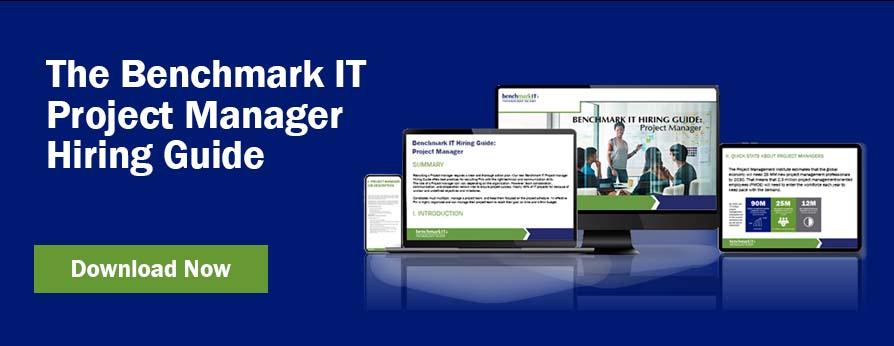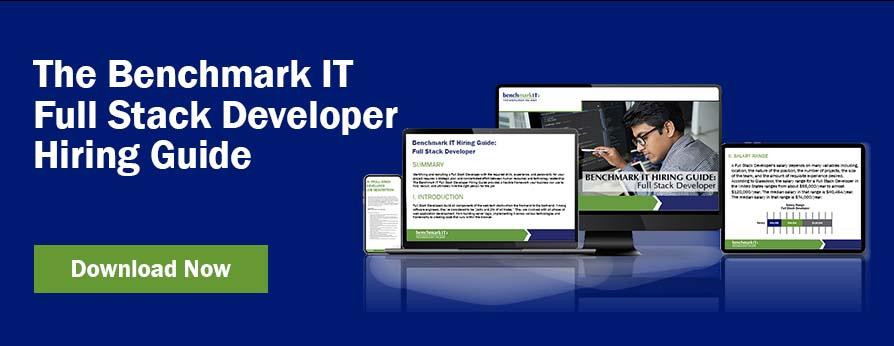The Benchmark IT DevOps Engineer Hiring Guide

The Benchmark IT DevOps Engineer Hiring Guide
By Nancy LaPerla On September 28, 2021 · In Hiring Advice
Updated: October 10, 2023
Benchmark IT has created a series of hiring guides to help take the guesswork out of hiring today’s most in-demand technology roles. We’re excited to introduce the latest in our series: The Benchmark IT DevOps Engineer Hiring Guide.
This article provides in-depth detail about DevOps Engineer roles and provides all the essentials to make your next hire successful.
DevOps is the combination of business philosophies, practices, and tools that quickly enables organizations to deliver applications and services. It’s a practice that relies on communication and collaboration between IT development and production teams by automating software deployment and infrastructure changes. DevOps goal is to provide rapid, frequent, and reliable deployment of software across the enterprise. As a result, companies can quickly achieve goals and create faster turnarounds in deploying new features, security patches, and bug fixes.
DevOps teams and positions have grown dramatically among startups, mid-market, and Fortune 500 companies seeking efficiency across business units. Particularly in startups, where it’s imperative to minimize headcount, DevOps plays an important role. In these environments, programmers must also be responsible for the deployment of production software implementations.
DevOps is grounded in agile and continuous integration and continuous delivery (CI/CD) methodologies. It emphasizes the importance of building bridges between teams instead of walls that separate development, operations, support, and management teams.
The DevOps communication ethos can benefit any company with an in-house IT department. DevOps offers a significantly shorter time to market and allows companies to provide new features, updates, and fixes to clients quickly and efficiently.
Attracting and hiring a DevOps Engineer with the experience and skills to create lasting improvements requires a comprehensive action plan. The Benchmark IT DevOps Hiring Guide provides a flexible framework you can use to attract, recruit and hire the right person.
The Benchmark IT DevOps Engineer Hiring Guide contains:
- The ideal DevOps Engineer salary (see the complete Hiring Guide for insights from our 2021 Technology Salary and Hiring Guide)
- The factors, traits, and skillsets needed for success

- Requirements for the ideal job description
- Interview questions for hiring managers, including notes for the interviewer
- Internal Recruitment Checklist
- Must-haves for a DevOps Engineer job advertisement
Determining Factors, Desirable Personality Traits, and Skillsets
DevOps Engineers need a variety of tech and soft skills to be successful throughout their career. The DevOps field is fast-paced, and new technologies and tools emerge all the time. Ideally, DevOps professionals should be curious and willing to be lifelong learners.
With companies now trending toward DevSecOps, it’s crucial to develop secure software from the start instead of adding it on later. People skills are also essential for DevOps success due to the need to tear down walls between groups. As developers, DevOps professionals often look to tools as opposed to people and processes.
Ideal candidates for this role should be proficient in source control, continuous integration, infrastructure automation, cloud, testing, and more.
DevOps Engineer Job Description Based on Your Organization
The Benchmark IT DevOps Engineer Hiring Guide provides a complete job description that is fully customizable to your organization’s needs. It includes responsibilities, desired skills and experience, and a comprehensive list of various duties.
Some vital responsibilities for a DevOps Engineer candidate include:
- Assist with the development, design, and deployment of web systems and the operation and integration of systems into existing infrastructure.
- Work closely with customers, IT professionals, and the executive suite to determine ongoing infrastructure needs for the company.
- Know frameworks like Java and AngularJS and be able to incorporate these into systems development.
- Keep up to date on new systems requirements and developments, resolving compatibility issues as they arise.
All responsibilities listed in the hiring guide are essential for a DevOps Engineer to complete projects successfully. There is also a bulleted list of desired competencies and experiences that you can customize to your organization’s exact project requirements.
The ideal DevOps Engineer candidate will possess most of the following:
- [X+] years of related industry experience in development and operations.
- Knowledge of the current and emerging operating systems.
- The ability to work across departments, processing input and developing solutions.
- Excellent communication skills.
This is just a shortlist of a successful DevOps Engineer’s needed skills and experience. You will find much more in the complete guide. Other necessary sections listed in the job description include Education and Experience, Travel and Work Hour Requirements, and Benefits.
DevOps Engineer Hiring Guide Interview Questions
DevOps requires a solid cultural and organizational shift for its implementation success. Collaboration between development, infrastructure, and the client is essential to allow for the rapid deployment of technology. The questions below help to gain insight into the candidate’s understanding of the process and tools.
The first four questions included in the DevOps Engineer Hiring Guide are as follows:
- Do you believe DevOps is essential in the current environment to successfully deliver and support software?
This question requires the candidate to define DevOps, its necessity or lack thereof in the process, and identify primary beneficiary. - What are your preferred development cycle, the pros and cons, and the actors and tooling involved?
This allows the candidate to speak on something they know well: the day-to-day duties of the job. The interviewer can see if there are any high-level knowledge gaps in the candidate’s answer. - What DevOps tools do you prefer to work with, and why?
Does the candidate have a thorough understanding of the DevOps environment and its regular workflow? The question also measures their experience managing a development and deployment system with a set of tools. - Can you tell me about the best practices you utilize for making a DevOps process work?
The candidate should be committed to move new features to market quickly. They are comfortable using automation throughout the process and able to maintain ongoing service to the customer.
The Benchmark IT DevOps Hiring Guide provides six more important questions and interviewer notes to help assess the candidate’s experience, skillsets, and personality.
The Hiring Guide also provides a template for a fully customizable Job Ad and a Recruitment Checklist for your recruiting efforts. The Job Ad offers a brief overview of the job description and highlights key elements of your employer branding. The Recruitment Checklist provides a comprehensive list of requirements and actions to take throughout your recruitment process.
Want to see more? Contact us for your copy of the new Benchmark IT DevOps Engineer, Full Stack Developer, or Project Manager Hiring Guides. Future guides for other highly sought-after technical roles will be available soon.
About Benchmark IT –Technology Talent
Benchmark IT offers technology consulting, executive search, and direct hire recruitment and staffing services. We service a wide range of clients and industries throughout the metro New York area and beyond. Our proprietary recruitment process, and dedication to precision, ethics, and personalized service sets us apart from other recruiting firms. As a result, Benchmark IT has become a trusted partner among Fortune-ranked companies, mid-market, start-up, and growth-phase firms since 2007. For additional information, visit: www.bmarkits.com.
TAGGED WITH → Hiring Advice

